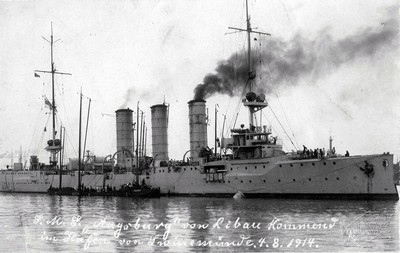3rd August 1914 - "Germany declares war against France. German cruiser bombards Libau..."
 |
| SMS Augsberg (photo from Europeana) |
Swinemünde a
Swinemünde a
port of Swinemude on 4th August 1914. The picture is from "War Memories" by Lieutenant Max Kranz. The port of Swinemude became the Polish city of Świnoujście after World War 2 and the Augsberg's target of Libau is now in Latvia and called Liepāja. The boundaries of Europe for ever shifting throughout history and no doubt will continue to do so into our unknown future. Liepāja is known in Latvia as "the city where the wind is born" because of the continuous sea breezes and as an ice free port on the Baltic has been a been a prized possession for military empires. Happily there are only sea festivals and walks on wide sandy beaches today. The tourist site says it is best enjoyed slowly.But let me return to the winds of war of this day in 1914
"In reply to a 12 hours ultimatum from Germany (expiring at 7 am), Belgium refuses to allow passage of German troops through her territory and King Albert sends "supreme appeal" to Kind George. German troops envelope Visé (which was afterwards burnt). General Joffre, French Commander-in-Chief, leaves Paris for the French frontier. Grand Duke Nicholas appointed Generalissimo of Russian Army. Australia offers 20,000 men. Sir Edward Grey's speech in the House of Commons. British naval mobilisation complete. Moratorium Bill passed. Bank holiday extended to August 7th". 'Our Diary of the War' War Illustrated.
On the actual Bank Holiday Monday of August of 3rd August people were enjoying the sunshine while reading newspaper headlines such as "Europe Drifting to Disaster" and nobody was sure whether Britain was yet definitely engaged in the war. That evening a boat from the Hook of Holland arrived at Harwich carrying 780 passengers instead of the expected 100. Among them were tourists who had been turned back at the French-German frontiers and told to get back home as quickly as possible.
The author WJ Makin wrote
"At Scarborough and Whitby crowds idled beside the sunlit waters of the North Sea, little dreaming that German battle cruisers were already contemplating bombardment of that particular coast-line. And on the other side of the North Sea the same scenes were to be witnessed. At Ostend, gay Continental crowds lounged along the plage. The Casinos were full, dance halls were crowded, orchestral concerts were drawing their huge crowds. Europe, generally, was prosperous and happy. It had been a good year for the crops, and everyone from Calais to Constantinople was looking forward to a bumper harvest....Life at that time for the common people of the Continent was simple and pleasant. Never again while they lived would they ever feel as secure"



No comments:
Post a Comment